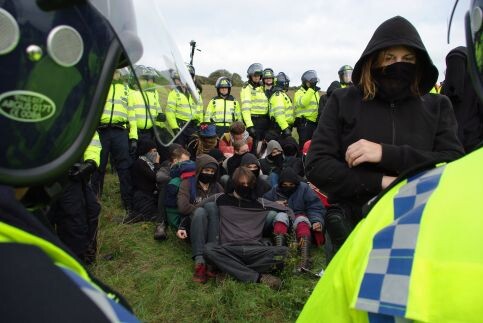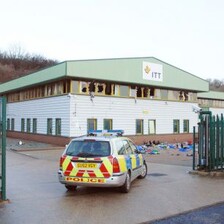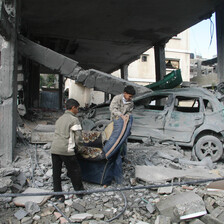The Electronic Intifada 22 October 2010

Police cordoned off activists and outnumbered them three to one. (Tom Wills)
As Israeli warplanes flew over Gaza on 13 October, activists converged on Brighton, United Kingdom for the annual mass action against the local EDO/ITT factory that produces components used in weapons by the Israeli Air Force, amongst others, to devastating effect.
Faces clad, dozens of protesters attempted to break through police lines. Outnumbered by police three to one, the activists were chased down, detained and arrested. The surreal background symphony continued: photographers’ flashes, stubborn traffic attempting to worm its way through police lines, the chants of “Free Palestine!” and the unmistakable sound of a police chopper circling overhead.
The campaign against EDO/ITT is now in its sixth year and this was the fifth convergence of its kind. The British police’s heavy-handed crackdown on the action should perhaps be no surprise given the success of past Smash EDO convergences and the ongoing weekly protests against the factory. The repression began in the early hours of the morning as dozens of activists sleeping in an accommodation center in Stanmer Park, located twenty minutes from the planned protest site, awoke to find the building surrounded by 27 riot police vans. Those trapped inside were only permitted to leave inside a police cordon — a mobile means of detention. Protesters who were able to reach the planned convergence space, a park close to the EDO/ITT factory, quickly met with an overwhelming force of riot police on foot and horseback.
Undeterred, protesters, numbering around 300, splintered off into smaller groups as the day quickly developed into an elaborate, and wholly unequal game of pursuit between activists and police. Sights such as a group of protesters, pursued by police, taking off into the woods carrying a large papier-mache airplane and inflatable hammers underlined the tragicomic nature of the demonstration. Two Israeli activists taking part in the action held an impromptu talk about the realities of day-to-day life for Palestinians under Israeli occupation to those held captive alongside them in a police cordon.
The day finally drew to a close late that afternoon with 53 arrests. Despite the overwhelming police presence at the protest site, the activists responded with spontaneous actions. This included successful rallies outside both Barclays Bank and the Royal Bank of Scotland (where protesters even glued themselves to the building), both known investors in the ITT corporation. Spirits were mixed as events wound down; factory production had been shut down for the day, but police repression saw the streets controlled and hopes of a successful siege of the factory were dashed. In spite of the massive police presence, the protest’s message resonated throughout the streets of Brighton: no war machine, not in my backyard.
Brighton’s long, loud and colorful history of activism against the war machine and those who profit from it continues to manifest itself in a slew of campaigns. New projects include a successful community guerrilla gardening takeover of the urban space earmarked for the opening of a supermarket giant Tesco store — known for stocking Israeli products produced in settlements in the occupied West Bank and Golan Heights. Activists have also initiated a “No Borders” campaign against the establishment of a new incinerator in the area slated to be run by the French multinational Veolia, which has been involved in the illegal Jerusalem light rail project. Established in 2006, the Brighton Jordan Valley Solidarity group continues to see many local activists travel to the Palestinian town of Tubas in the occupied West Bank each year as part of a strong ongoing solidarity campaign and unofficial partnering of the two cities.
The Smash EDO campaign embodies the growth of the new anti-militarist movement in the UK in recent years that hits back against the government’s thinly-veiled complicity with, and profiteering from, illegal occupations in Palestine, Iraq and Afghanistan. Activists with the campaign also say its a response to the mainstream anti-war movement’s politicking and well-behaved protest marches. The Smash EDO campaign relates to the successful campaign in the UK and Ireland against Raytheon, which culminated in the 2006 destruction of the American defense contractor’s offices in Derry, Northern Ireland during Israel’s 2006 invasion of Lebanon.
The underlying momentum of the movement is founded in the belief that war crimes can and must be stopped, but not through the petitioning of arms traders or political hand-wringing. Speaking about EDO/ITT, Smash EDO spokeswoman Chloe Marsh says that “since the campaign started they [EDO/ITT] have closed down around 25 percent of the business from their main site plus sold off one other location which was also targeted by direct action activists. They might just be a small part of the war machine, but they are one that exists in our local community, making them a ‘doable’ target. Every bomb that is dropped, every bullet that is fired in the name of this war of terror has to be made somewhere — and wherever that is it can be resisted.”
“We will be there until they’re not,” says Marsh. “In other words, the ultimate goal is the factory’s closure.” Considering the odds that the campaign continues to stack against the weapons manufacturer, this not only seems a tangible victory, but highlights the universal wisdom in “think globally, act locally.”
Bridget Chappell is an Australian activist and writer who worked with the International Solidarity Movement in Palestine from August 2009 through May 2010.





